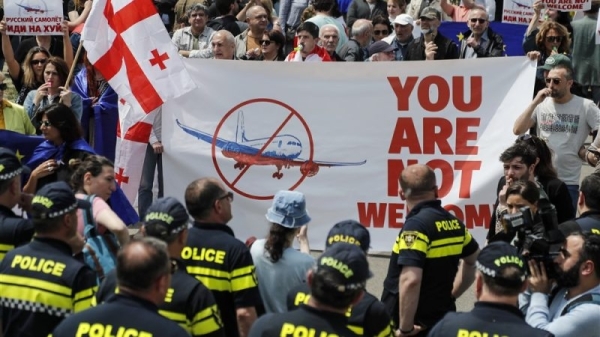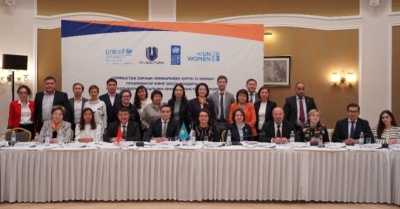Moscow-Tbilisi flights weigh on Georgia EU candidate status prospects

The recent resumption of direct air traffic between Moscow and Tbilisi risks further clouding Georgia’s EU candidacy prospects. However, the authorities in Tbilisi believe the development should play in their favour.
Georgia has in recent months tried to balance rapprochement with Russia and its aspirations to join the EU.
But critics have accused Prime Minister Irakli Garibashvili’s government of undermining Georgia’s European integration and flirting with the Kremlin.
Last June, EU leaders stopped short of granting Georgia candidate status while extending it to Ukraine and Moldova. Instead, they urged Tbilisi to reform its justice and electoral systems, improve press freedom, and curtail the power of oligarchs.
EU demarché
Tbilisi last month welcomed a move by Russia to lift a four-year-old ban on direct flights with Georgia and remove a decades-old visa requirement for Georgians travelling to Russia.
There have been no formal diplomatic ties between the two countries since Russia invaded Georgia in 2008, following years of tensions over Tbilisi’s pro-Western orientation.
The resumption of air travel between the two countries came as Moscow’s offensive in Ukraine stretches well into its second year and the EU countries have banned all flights to Russia.
The move caused protests by the opposition in Tbilisi, and President Salome Zourabichvili, who is at loggerheads with the government, called for a boycott of the national carrier Georgian Airways.

Georgians protest resumption of Russia flights
After Russia restored visa-free travel for citizens of Georgia on 10 May and lifted a ban on direct flights between the two countries imposed in 2019. Hundreds of Georgians took to the streets to protest this rapprochement.
EU ambassadors accredited in Georgia met on Monday (29 May) with Deputy Prime Minister and Economy Minister Levan Davitashvili to deliver a demarche over Georgia’s resumption of flights with Russia.
“We expressed the EU’s concern and regret over the resumption of air travel between Georgia and Russia. This decision runs counter to the EU decision not to fly to Russia and to exert pressure on it,” the EU ambassador to Georgia, Pawel Herczyński, told reporters after the meeting.
Many Georgians oppose any rapprochement with Moscow, whose troops occupy two Georgian regions – Abkhazia and South Ossetia – which make up around one-fifth of the country’s territory.
Others are more open to the idea, however, and the Georgian government has in recent years worked to improve ties with Moscow, declining to impose sanctions on Russia over the war in Ukraine.

Georgia races to convince sceptics on EU candidate status reforms
Georgia has implemented 80% of the European Commission’s recommendations to earn EU candidate status, the country’s Foreign Minister Ilia Darchiashvili told EURACTIV, as Tbilisi races to convince it to progress to the next steps in the bloc’s accession process.
Davitashvili said he has assured the EU envoys the flights will not be serviced by companies subject to EU sanctions, and that all Russian passengers will be thoroughly checked.
He stressed that Georgia shares a border with Russia and “is in a different context to that of the EU countries”.
Another issue discussed at the meeting was Georgia’s overall compliance with EU sanctions against Russia.
“We communicated that we fully abide by them, both at the Lars checkpoint and at our country’s airports,” Davitashvili said.
“European countries have continued to trade with Russia, even after the fighting started in Ukraine. Some of them have been doing more trade, others have scaled [it] back,” Davitashvili added.
Foreign policy alignment
The EU said earlier this month it regretted that Georgia was resuming flights to Russia at a time when the bloc has closed its airspace to Russian planes.
“This latest decision by Georgia’s authorities raises concerns in terms of Georgia’s EU path and its commitment to align with the EU in the foreign policy as per the EU-Georgia Association Agreement,” said the EU’s lead foreign affairs spokesperson, Peter Stano.
“Regrettably, Georgia’s alignment rate with EU’s Common Foreign and Security Policy (CFSP) decisions and declarations has gone from a low 44% last year to only 31% so far this year,” Stano added.
EU officials have also started making comparisons with Moldova’s alignment rate with EU CFSP decisions and declarations. Chișinău is in a similarly challenging situation vis-à-vis Russia, but the country’s alignment rose from around 54% last year and 72% so far this year.
Georgia’s rate, meanwhile, over the past three years dropped from 61% in 2020 to 53% in 2021, 44% in 2022 and 31% as of May this year.
‘More assured’
The European Commission is expected to release its annual assessment of Georgia’s progress later this year, with an oral presentation of the EU executive’s twelve reform priorities expected in June and the formal enlargement package in autumn.
Georgia’s Foreign Minister Ilia Darchiashvili told EURACTIV last month his country has implemented 80% of the European Commission’s recommendations to earn EU candidate status.
However, even if the European Commission were to give a green light for granting candidate status, it would still be up to EU leaders to decide.
Georgian Dream ruling party officials, however, say they believe the situation could play in their favour.
“We have to analyse why the Russians did this [lifting the ban] right now – it is exactly for the reason to damage the reputation of Georgia,” Foreign Committee Chair of the Georgian Parliament, Nikoloz Samkharadze (Georgian Dream), told EURACTIV in Tbilisi.
“I am even more assured of [Georgia receiving EU candidate status] after the Russian decision because I believe Russians have also sensed that Georgia is going to get different status,” he said when asked whether the resumption would threaten the country’s EU prospects.
“Russia now sees that Georgia is getting closer to a potential launch of negotiations with the EU on accession, and they want to undermine Georgia’s European path,” Samkharadze said.
EURACTIV understands that Tbilisi apparently expects Brussels to give the country candidate status precisely as a signal that it is not distracted by what could simply be a Russian provocation.
Read more with EURACTIV




